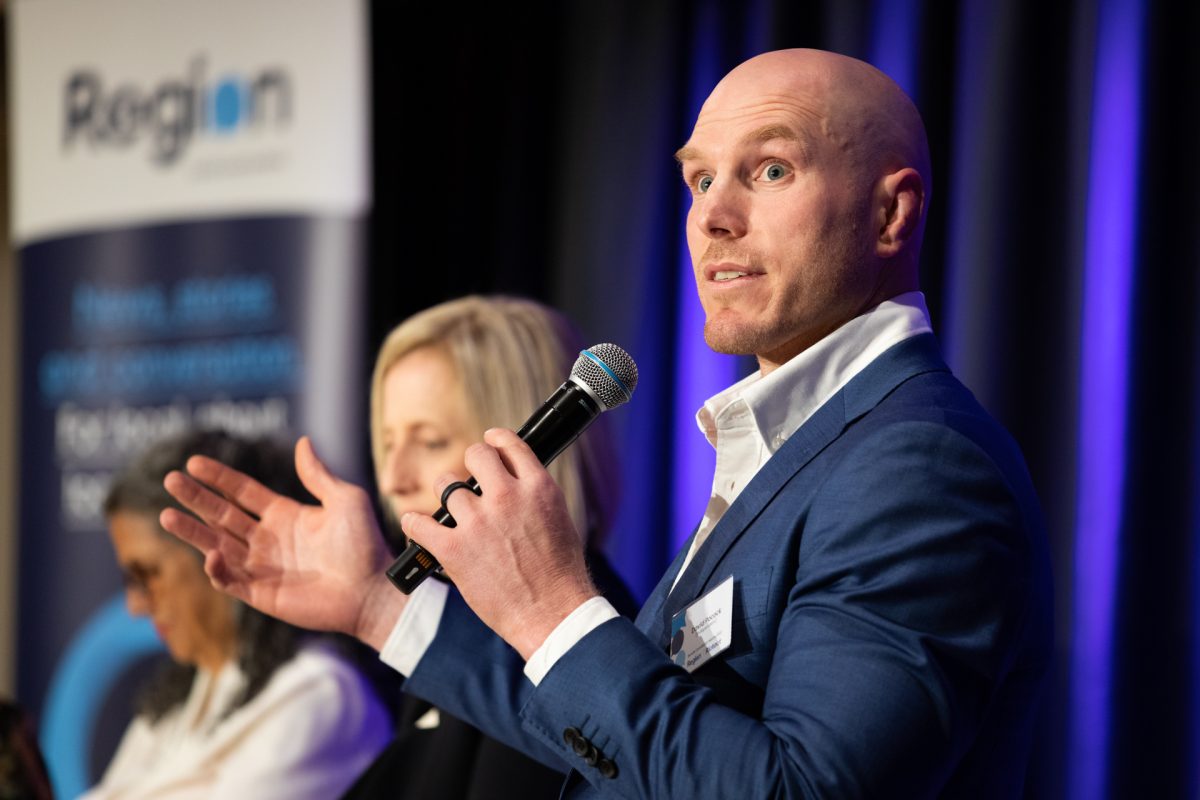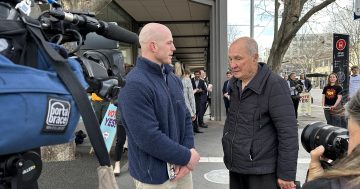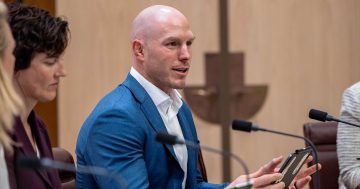
Independent David Pocock made an impression at Region’s Senate debate. Photo: Michelle Kroll.
A surging David Pocock appears to have momentum in the ACT Senate race two weeks out from the 21 May federal election, according to a new poll out today.
The Redbridge robo-phone survey of voting intentions for the Climate 200 group shows Liberal Senator Zed Seselja is in danger of losing his seat on preferences in what would be a major upset.
It shows Mr Pocock increasing his primary redistributed vote to 21 per cent from 13 per cent in a similar poll a month ago to overtake the Greens’ Tjanara Goreng Goreng, who has slumped from 15 per cent to 11 per cent. It puts Pocock in striking distance of Senator Seselja and Labor’s Senator Katy Gallagher.
Mr Pocock appears to be taking votes off Labor and the Greens, and convincing undecided voters, with Senator Gallagher joining Senator Seselja below quota.
A month ago she looked home and hosed at 35 per cent, but the new poll has her still leading at 27 per cent, just 2 per cent more than Senator Seselja who has picked up a point since last month to 25 per cent.
But second preference intentions suggest big problems for Senator Seselja, who could only muster 13 per cent, compared with Mr Pocock’s 24 per cent and Senator Gallagher’s 23 per cent.
Fourteen per cent of those surveyed said they would give their second preference to the Greens.
The saving grace for Senator Seselja may be the 6 per cent intending to allocate their first preference to the United Australia Party candidate James Savoulidis, whose preferences could get him over the line.
The other Independent, Kim Rubenstein, has held her primary vote at 6 per cent.
Labor has preferenced independent candidates Mr Pocock and Professor Rubenstein ahead of the Greens. The Liberals are not directing preferences.
The Greens have listed Professor Kim Rubenstein’s party (Kim 4 Canberra) second, Mr Pocock third and Labor fifth.
It is understood Mr Pocock will suggest voters preference Professor Rubenstein. He has encouraged people to vote in line with their values.
Climate change and the environment remained the most important issues for those surveyed, followed by integrity and trust in politics and cost of living.
ANU Emeritus Professor of Politics John Warhurst said the poll gave Mr Pocock a real chance with Senator Seselja’s primary vote down to a level that put him in danger.
“I would probably put Pocock the favourite now for that second seat,” he said.
Preferences would be the key, and the poll suggests the Greens and Kim Rubenstein’s preferences would have to be very tight for Mr Pocock to get up, Professor Warhurst said.
“It also shows that the United Australia Party result is not an insubstantial number and Zed will be hoping to pick up second preferences from them and the other smaller candidates,” he said.
While these type of polls have a large margin for error and should be treated with caution, Professor Warhurst said it was better to be in Mr Pocock’s position than Senator Seselja’s.
Professor Warhurst said it was a huge task to oust Senator Seselja but this was the most substantial challenge he has faced.
He said it needed to be seen in the context of the general Independent challenge to Coalition candidates across the country and the nature of Senator Seselja’s politics.
Previously successful Independent campaigns in Warringah against Tony Abbott and in Indi against Sophie Mirabella benefited from the polarising nature of the incumbents, much like Senator Seselja.
“Even if people aren’t reading about the Senate contest in the ACT, they are reading about the teal Independents, about climate action, corruption commissions, all of the things the Independents are running on here in the ACT,” Professor Warhurst said.
But he believes that Senator Seselja will only be beaten if Prime Minister Scott Morrison loses power.
“If there is a really strong Labor vote and push to get rid of the government, that makes it more likely that Zed will lose,” Professor Warhurst said.
“I can’t envisage a situation where Scott Morrison wins the election and Zed loses. There is a connection between them.”
In 2019, Senator Seselja brushed off the Greens’ challenge despite the Liberal vote again dipping below quota, to 32.4 per cent, but there were plenty of preferences to get him home comfortably.




















